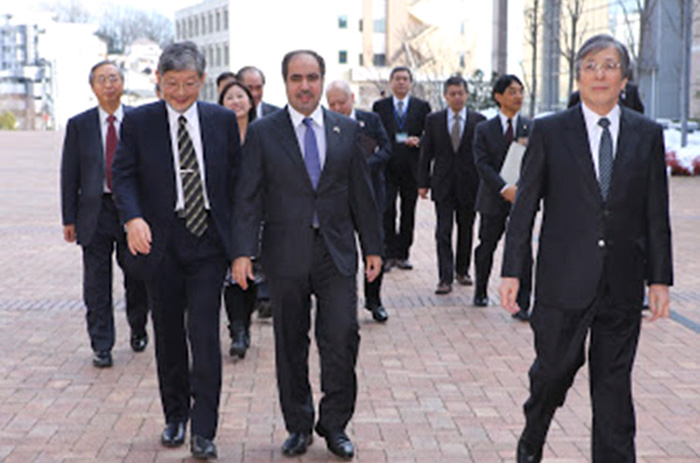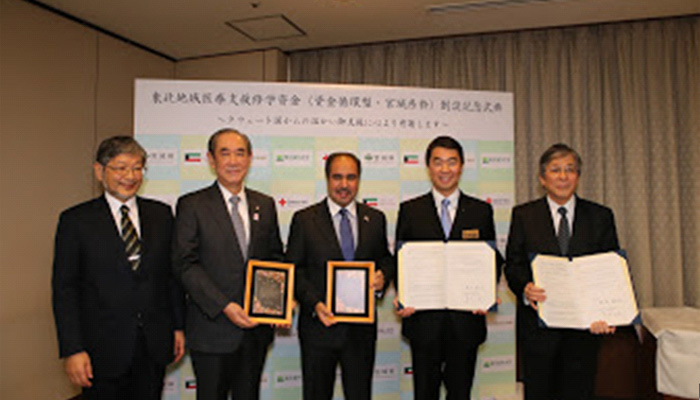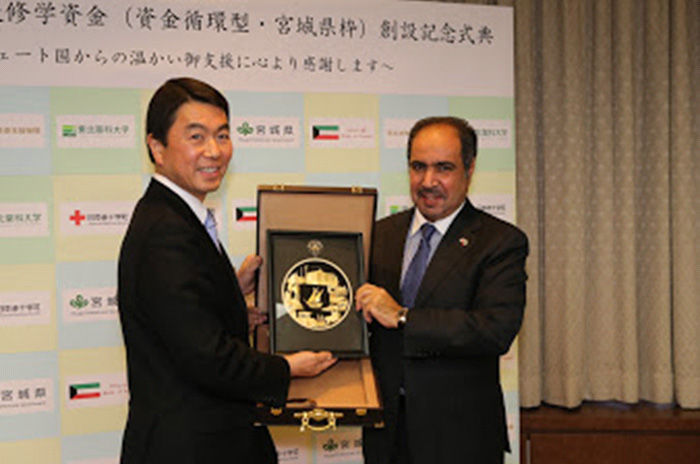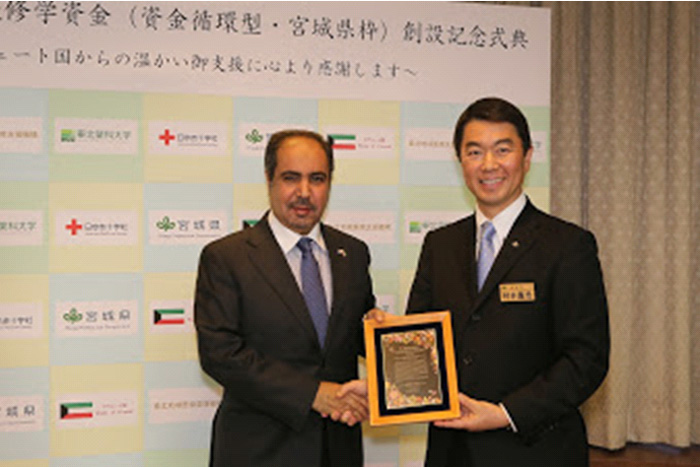2/10/2016
Quake-hit Miyagi Prefecture Thanks Kuwait for Medical Study Fund
SENDAI, Japan, Feb 10 (KUNA) - Japan's quake-hit Miyagi Prefecture on Wednesday offered a renewed appreciation for Kuwait's heartwarming support following the 2011 disaster, as it launched the Kuwait Partnership Fund for Medical Education that contributes to the recovery of regional healthcare system. The JPY 9 billion (USD 104 million) study fund is part of the JPY 16.2 billion (USD 188 million) reconstruction fund established in Miyagi five years ago by utilizing Kuwait's crude oil donation.
Soon after the 9.0-magnitude earthquake and ensuing tsunami that hit the northeastern Japanese region including Miyagi in March 2011, Kuwait offered Japan 5 million barrels of crude oil, worth about USD 500 million at that time, by the initiative of His Highness the Amir Sheikh Sabah Al-Ahmad Al-Jaber Al-Sabah.
At a foundation ceremony held in Sendai City with participation of Kuwaiti Ambassador to Japan Abdulrahman Al-Otaibi, Governor of Miyagi Prefecture Yoshihiro Murai expressed sincere gratitude to Kuwait for its support in the aftermath of the massive disaster, which left more than 18,000 people dead or missing in the region. Miyagi was hit the hardest with some 11,000 victims and 500,000 damaged or destroyed buildings.
"In order to keep the graduates here in Miyagi, a new study fund has been established using JPY 9 billion of the contribution received from Kuwait through the Japanese Red Cross Society. We hope the study fund, which bears Kuwait's name, will benefit the medical students for years to come," the governor added.
The study fund provides scholarships to 30 medical students per year from Miyagi, who commit to working at designated medical institutions in the prefecture for 10 years after graduation from the new school.
The governor also gave the ambassador a commemorative plate presented to His Highness the Amir, which is engraved with his appreciation, saying, "The fund will support ambitious students who will become important contribution to community health care in Miyagi Prefecture. We will work with tireless determination to restore our home, and we wholeheartedly appreciate the State of Kuwait's continued support in these efforts."
In his speech, Al-Otaibi pointed out that some survivors have restored their life and business activities, but there are people yet suffering from physical and mental hardship along the disaster struck area. "The governor has informed me that there are not enough hospitals and clinics there due to the lack of medical staff. Today, one clear solution to this grave concern has been crystalized and presented here," Al-Otaibi said.
He also hailed Miyagi Prefecture's determination to dedicate large portion of the reconstruction fund to the medical education, which helps alleviate the pain of the affected people and further advance their return to normal life. The true friendship that binds Japan and Kuwait was once visualized through the noble decision made by His Highness the Amir to extend support for the disaster-struck people and region as crude oil donation, the ambassador noted. "The donation was just a small token of appreciation to the people of Japan for their historic stances in supporting the Kuwaiti people during over five decades."
For his part, Dr. Motoaki Takayanagi, Representative Director of Tohoku Community Medicine Assistance Organization, which manages the fund, said he is grateful for the support the organization has received from Kuwait, the Japanese Red Cross Society and the prefectural government.
"We are working very diligently to prepare for the opening of the new school. Our university hopes to nurture our students to become doctors with well-rounded character and a deep understanding and respect for life who will contribute to regional medicine that patients can depend on," said Dr. Takayanagi, who also serves as President of Tohoku Medical and Pharmaceutical University.
After the ceremony, the ambassador also inspected Tohoku Medical and Pharmaceutical University. (end)







